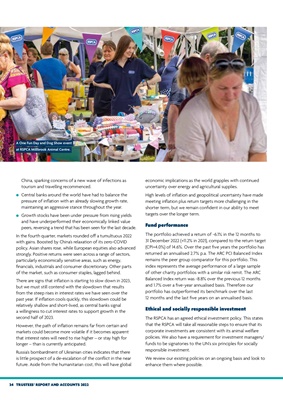
TRUSTEES' REPORT AND ACCOUNTS 2022
34 China, sparking concerns of a new wave of infections as
tourism and travelling recommenced.
l Central banks around the world have had to balance the
pressure of inflation with an already slowing growth rate,
maintaining an aggressive stance throughout the year.
l Growth stocks have been under pressure from rising yields
and have underperformed their economically linked value
peers, reversing a trend that has been seen for the last decade.
In the fourth quarter, markets rounded off a tumultuous 2022
with gains. Boosted by China's relaxation of its zero-COVID
policy, Asian shares rose, while European equities also advanced
strongly. Positive returns were seen across a range of sectors,
particularly economically sensitive areas, such as energy,
financials, industrials and consumer discretionary. Other parts
of the market, such as consumer staples, lagged behind.
There are signs that inflation is starting to slow down in 2023,
but we must still contend with the slowdown that results
from the steep rises in interest rates we have seen over the
past year. If inflation cools quickly, this slowdown could be
relatively shallow and short-lived, as central banks signal
a willingness to cut interest rates to support growth in the
second half of 2023.
However, the path of inflation remains far from certain and
markets could become more volatile if it becomes apparent
that interest rates will need to rise higher - or stay high for
longer - than is currently anticipated.
Russia's bombardment of Ukrainian cities indicates that there
is little prospect of a de-escalation of the conflict in the near
future. Aside from the humanitarian cost, this will have global
A One Fun Day and Dog Show event
at RSPCA Millbrook Animal Centre.
economic implications as the world grapples with continued
uncertainty over energy and agricultural supplies.
High levels of inflation and geopolitical uncertainty have made
meeting inflation plus return targets more challenging in the
shorter term, but we remain confident in our ability to meet
targets over the longer term.
Fund performance
The portfolio achieved a return of -6.1% in the 12 months to
31 December 2022 (+11.2% in 2021), compared to the return target
(CPI+4.0%) of 14.6%. Over the past five years the portfolio has
returned an annualised 2.7% p.a. The ARC PCI Balanced Index
remains the peer group comparator for this portfolio. This
index represents the average performance of a large sample
of other charity portfolios with a similar risk remit. The ARC
Balanced Index return was -8.8% over the previous 12 months
and 1.7% over a five-year annualised basis. Therefore our
portfolio has outperformed its benchmark over the last
12 months and the last five years on an annualised basis.
Ethical and socially responsible investment
The RSPCA has an agreed ethical investment policy. This states
that the RSPCA will take all reasonable steps to ensure that its
corporate investments are consistent with its animal welfare
policies. We also have a requirement for investment managers/
funds to be signatories to the UN's six principles for socially
responsible investment.
We review our existing policies on an ongoing basis and look to
enhance them where possible.